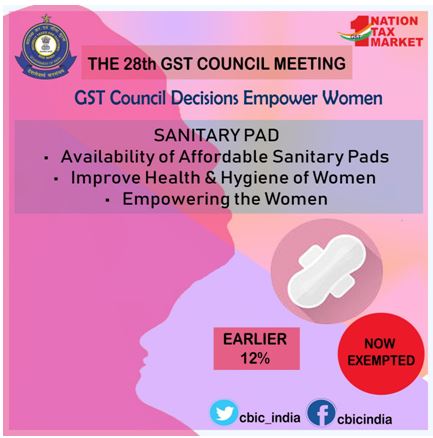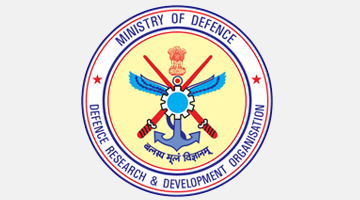JULY 25, 2018
By Vijay Kumar
Be careful what you wish for because you might get it
An old Chinese proverb goes, "Be careful what you wish for because you might get it". If one goes by the news reports and social media comments, it would appear that the greatest happening in that greatest post-Independence taxation happening is the exemption announced for sanitary napkins. Champions of the napkin movement were vociferous in their attack on the Modi Government on the unfair tax on sanitary napkins. There were a couple of writs in High Courts and one High Court is reported to have remarked, "why sanitary napkins are not exempt from the Goods and Services Tax, when items like bindis, sindoor and kajal were kept out of its ambit." The Union of India has filed a transfer petition in the Supreme Court and the Apex Court has stayed the proceedings in the High Courts.
Now that the GST Council has announced its decision to reduce the GST on napkins from 12% to NIL, all these cases cease to have even academic interest. The Council's recent decision has been hailed as one of the best ever decisions the mighty Council has ever taken. Finance Minister Piyush Goyal declared that mothers and sisters will be very happy to hear that sanitary pads are now 100 percent exempt from tax. Swati Maliwal of the Delhi Commission for Women tweeted, " Centre displayed extreme arrogance by not exempting sanitary napkins from GST over past 1 year! Glad that finally GST Council has made this happen. When Bindis & Sindoor can be exempt from tax, why not pads - lack of which cause terrible suffering to girls and women ". Even before GST was launched, she had written to the then Finance Minister, " Understandably, taxation of sanitary napkins which is a basic necessity, denies its access to many. It makes sanitary napkins unaffordable for millions of poor Indian women who end up using dangerous materials such as dirty cloth, straw and sand instead………..This one decision of the Union government shall positively impact and improve the health and hygiene of millions of women ."
Goa Chief Minister Manohar Parikkar tweeted, A welcome decision to exempt sanitary napkins from GST at the 28th #GSTCouncilMeet chaired by Shri @PiyushGoyal . An important step by @narendramodi Govt. that is vital to the health and well-being of women and girls .
Rajasthan Chief Minister Vasundhara Raje tweeted, The landmark decision to exempt #GST on #SanitaryNapkins is another welcome amendment and a long standing demand of women across #India. A reminder that the #ModiSarkaar stands with its people - a government of the people.
Union Minister Smriti Iranihad equal praise, Thankful to GST Council and Minister @PiyushGoyal for exempting Sanitary Napkins from GST; a welcome step towards encouraging menstrual hygiene among young girls and women.
If this was such a bad tax, why did it bloody exist for the last one year?
Mr. Arun Jaitley had explained in November 2017 that - If you reduce the 12% tax rate on sanitary napkins, we won't have an Indian manufacturer left; the Indian market would be flooded with cheaper Chinese products and as a result, the Indian manufacturing sector would suffer greatly. So, he was doing a favour to the Indian Industry by levying that 12% GST on sanitary napkins, which lofty aim somehow went above the heads of television anchors, women activists and some lawmakers.
The Government of India gave an official clarificatory explanation in a Press Note dated 10.07.2017 which stated:
|
GST rate for Sanitary Napkins
10-July-2017 18:48 IST
_________________________________________________
There are some remarks made by various column writers on GST rate on sanitary napkins. It may be mentioned that the tax incidence on this item before and after GST is the same or less.
Sanitary napkins are classifiable under heading 9619. In preGST, they attracted concessional excise duty of 6% and 5% VAT and, the preGST estimated total tax incidence on sanitary napkins was 13.68%. Therefore, 12% GST rate had been provided for sanitary napkin.
Major raw materials for manufacture of sanitary napkins and applicable GST rates on them are as under:
a) 18% GST rate
• Super Absorbent Polymer
• Poly Ethylene Film
• Glue
• LLDPE- Packing Cover
b) 12% GST rate
• Thermo Bonded Nonwoven
• Release Paper
• Wood Pulp
As raw materials for manufacture of sanitary napkins attract GST of 18% or 12%, even with 12% GST on sanitary napkins, there is an inversion in the GST structure. Though, within the existing GST law such accumulated ITC will be refunded, it will have associated financial costs [interest burden] and administrative cost, putting them at a disadvantage visàvis imports, which will also attract 12% IGST on their imports, with no additional financial costs on account of fund blockage and associated administrative cost of refunds.
If the GST rate on sanitary napkins were to be reduced from 12% to 5%, it will further accentuate the tax inversion and result in even higher accumulated ITC, with correspondingly higher finical costs on account of fund blockage and associated administrative cost of refunds, putting domestic manufacturers at even greater dis advantage visàvis imports.
Reducing the GST rate on sanitary napkins to Nil, will however, result in complete denial of ITC to domestic manufacturers of sanitary napkins and zero rating imports. This will make domestically manufactured sanitary napkins at a huge disadvantage visàvis imports, which will be zero rated.
|
So, according to the Government's opinion in July 2017 and November 2017, a 5% GST on Sanitary Napkins would have been a disaster and a nil rate would have been a calamity. Come July 2018 and this is what the Government says, Didn't they realise in July 2017 and November 2017 that nil rate on sanitary napkins will improve health & hygiene and empower women?

Now, what is going to happen? Will the price of sanitary napkins go down? Not likely as per the explanation given by Arun Jaitley. But the present Finance Minister is reported to have said, " I have already instructed the department which looks after anti profiteering to investigate to ensure that either the rates would have come down on July 1,2017, or it should come down now. It cannot be that they have the cake and eat it too". Arun Jaitley is strangely silent now on this issue, though he is very active on twitter and Facebook. Who is right? Arun Jaitley or Piyush Goyal? Both can't be .
GST is a very simple tax and the stakeholders should be very careful about what they ask the Government. This kind of aberration had happened earlier in Central Excise, when certain goods like Naphtha and ready built houses were exempted. They had to pay 8% on the exempted goods and that was a disaster that made industrialists rush to the North Block begging the Government to impose some duty on the exempted goods. Now, perhaps, all the activists in favour of the, "No tax on bleeding" campaign will have to request the Government and GST Council to impose at least a nominal tax on sanitary napkins so that some of the input tax can be retrieved and the price levels maintained. It was certainly a messy affair.
Moral of the story, as the Chinese proverb says is, "Be careful for what you wish for because you might get it" and as of now, the Chinese may have the last laugh.
Demand of Rs. 1.32 Crores for not filling e-way bill correctly: A transport Company was directed to pay an amount of Rs. 1,32,13,683/, by an Assistant Commissioner of SGST, which was confirmed by a Joint Commissioner, for not uploading/updating the part-B of the e-way bill which is a required condition to be fulfilled in accordance with Rule 138(5) of the M. P. Goods and Services Tax Rules, 2017. The transporter approached the High Court in writ petition which was dismissed. They are now before the Supreme Court and the transporters are off the roads on strike. Don't take your e-way bill lightly lest you should get stuck on the road. Please see 2018-TIOL-2809-HC-MP-GST. |









 Download PDF
Download PDF






